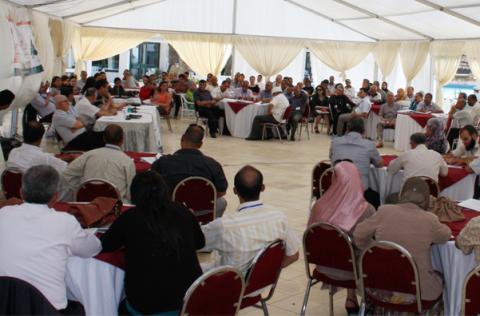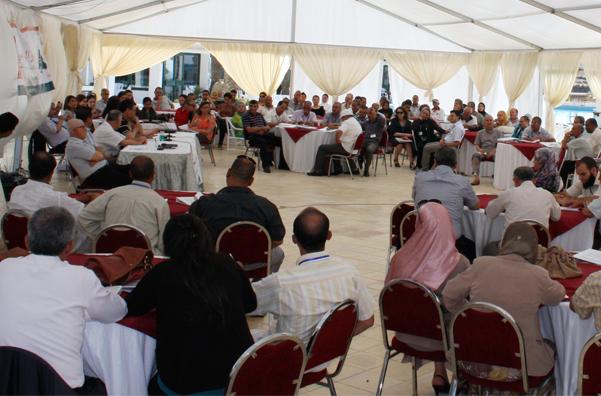
Dr Chedly Maksoudi volunteered to participate in the Citizens’ Jury for health because he was concerned that health services were distributed unevenly between different regions of Tunisia: “The inequality of the system leaves people uncared for and that is simply unacceptable. There is also a vast difference in quality of care between the public and private sector. I see sick people who are dying of things that are preventable, because of a lack of health care workers, medicines, and in some cases delayed diagnosis due to a break-down in service delivery.”
Dr Maksoudi works in the Intensive Care Unit at the Regional Hospital of Kasserine, Tunisia; an area without many resources for health care, which causes delayed diagnosis. This summer Dr Maksoudi was one of 100 volunteers selected out of 3600 lottery contestants to form the Jury. Jury members were asked to guide the government on: health system-financing, neighbourhood health services, revitalizing and rebuilding confidence in the health sector, and promoting healthy lifestyle choices.
People-centred approach to health systems
The ‘Citizens’ Jury’ is part of a new Social Dialogue Programme supported by the WHO through the Universal Health Coverage Partnership. Dr Marie-Paule Kieny, Assistant Director-General at WHO, explains that: “Involving the community is part of a people-centred approach to health systems that aims to motivate individuals to make decisions about their own health – making health systems more efficient and effective.”
Dr Maksoudi, who has been in the public health sector for 15 years, says that the health-care system needs to adjust to better serve the people of Tunisia because: “I am a citizen before being a doctor and there have been a lot of flaws in the health care system of Tunisia for many years now.”
This Programme builds on evidence-based research, coupled with workshops, focus groups, and town hall meetings. Dr Ann Lise Guisset, the Health Systems Advisor for WHO in Tunisia, explains that the programme made it a priority to include the entire community: “We had medical students go into each region and hand out invitations to citizens in parks and cafes explaining that people could to get involved and represent their community to help initiate change in the health system of Tunisia.”
Faical Ben Salah, President of the Technical Committee on Societal Dialogue, was amazed by the population’s enthusiasm: “The dynamic created by this programme has gone well beyond our expectations – we are hearing views from cross-sections of the population, from coastal fisherman to single mothers, schoolteachers, students, and health professionals.”
Citizens’ Jury’s recommendations
Dr Maksoudi summarizes the findings saying that: “The ‘Citizens’ Jury’s’ recommendations focus on increasing solidarity in health financing to provide a more equitable health system with balanced care that respects all citizens.”
The Social Dialogue Programme has brought together more than 4200 people from all walks of life in Tunisia since it started in 2012. In September 2014 the National Health Conference agreed unanimously to use the Citizens’ Jury report in a formal declaration.
Interim Prime Minister, Mehdi Jomâa, announced at the Conference that: “The government pledges to establish an efficient and quality health system that is accessible to all citizens in all regions.”
Next steps will involve creating a committee that includes citizens and oversees the implementation of pilot programmes based on the declaration. With financial and technical support from WHO and other partner organizations, the Programme will work to strengthen service delivery and community based activities.
Dr Guisset describes an emotional moment from the Conference saying: “When everyone stood up in favour of the declaration and the national anthem started playing in celebration – I had tears in my eyes because we have been working on this for so long and I could see that it would truly make a difference.”
This article has been re-posted from the WHO website.
